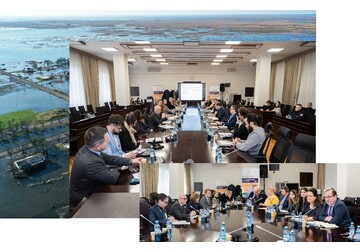
Resilience of critical infrastructure is improving in Moldova
This was stated during the final meeting of the project “Strengthening Critical Infrastructure Resilience in the Republic of Moldova”, funded by the Government of Poland, organized by the Ministry of Infrastructure and Regional Development of Moldova in partnership with the United Nations Office for Disaster Risk Reduction (UNDRR). The event was attended by representatives of central government authorities, UN agencies, development partners and international financial institutions. The project was launched in July 2024 and aimed to assess the resilience of critical infrastructure in Moldova in the energy, communications (ICT), transport, water and sanitation sectors using a global methodology developed by UNDRR and the Coalition for Disaster Resilient Infrastructure. Moldova was the first country in the region to implement this innovative approach, previously applied in Asia-Pacific, Africa and Latin America. During the meeting, participants analyzed the project results and recommendations presented in the Final Report, which highlighted existing vulnerabilities, critical interdependencies between and within sectors, and proposed concrete measures to strengthen disaster risk response and adaptation capacities in line with the new National Strategy for Disaster Risk Reduction and the National Program for EU Accession. The State Secretary of the Ministry of Infrastructure and Regional Development of Moldova, Corneliu Cirimpei, who was present at the event, noted the importance of moving from a predominantly reactive to a proactive approach in risk management. According to him, disaster risk management in Moldova currently focuses mainly on reacting to events rather than on proactive risk reduction measures. “We have a good opportunity to update and harmonize the regulatory framework to strengthen preparedness capacity so that vital services such as electricity, water, transport, and communications continue to function even when we face disasters,” he said. The implementation of the project was led by a technical working group co-chaired by UNDRR and the Moldovan Ministry of Infrastructure and Regional Development, which included representatives from six key ministries, the State Chancellery, the Agency of Geodesy, Cartography and Cadastre, the State Inspectorate for Emergency Situations, UN agencies and civil society organizations. This group played a central role in shaping the roadmap through consultations, webinars and workshops, ensuring a collaborative cross-sectoral approach. // 09.04.2025 - InfoMarket







